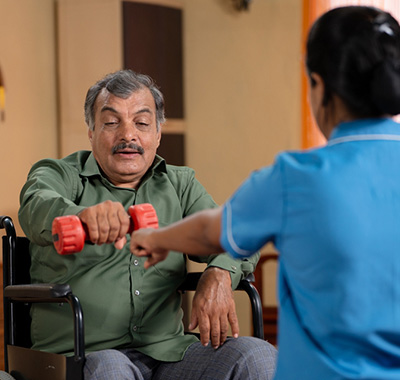Physiotherapy Sessions at Home
YOUR JOURNEY TO RECOVERY START HERE
Our Goal
Our comprehensive physiotherapy treatment is designed to effectively manage your injuries and impairments, preventing further complications.
- Managing your pain
- Maximizing functionality
- Enhancing quality of life
- Supporting daily activities
- Minimizing physical limitations
- Preventing secondary impairments

Benefits of Our Services
we focus on pain management, functionality, and independence. Our individualized, consent-driven, and result-oriented physiotherapy puts your needs first.
- Personalized Treatment Program
- Injury and Impairment Management
- Pain Management to manage and relieve pain
- Restore independence and quality of life
- Minimization of Limitations and Mobility issues
- Measurement and Maximization of Functionality
- Functionality Enhancement treatment
- Support Participation in Daily Activities
Key Features of Our Physiotherapy Service
- Result-Oriented Physiotherapy Program
- Wide Range of Specialized Physiotherapy
- Advanced cutting-edge technology
- Multi-speciality therapy team
- Detailed Assessment for personalised care plan
- Flexible Physiotherapy Services

What are the types of physiotherapy?
Physical therapy is a combination of hands-on techniques (a therapist moving part of your body) and exercises or movements you perform with a physical therapist’s supervision. Physical therapy can include:
Stretching
Strength training
(with or without weights or exercise equipment).
Massage
Heat or cold therapy
Hydrotherapy.
Transcutaneous electrical nerve stimulation (TENS)
Get Physiotherapy for Conditions like

Musculoskeletal Injuries
Strains, sprains, fractures, tendonitis, etc.

Back and Neck Pain
Poor posture, herniated discs, muscle imbalances.

Sports Injuries
Ligament tears, muscle strains, joint dislocations.

Arthritis
Joint mobility, pain reduction, muscle strengthening.

Post-Surgical Rehabilitation
joint replacements, ligament repairs, spinal surgeries.

Neurological Conditions
Stroke, Parkinson's, multiple sclerosis, spinal cord injuries.

Repetitive Strain Injuries (RSI)
Carpal tunnel syndrome, tennis elbow, golfer's elbow.
Choose your mode of physiotherapy

Online
Online sessions with our specialist for quick recovery at home.
- Initial assessment of current condition.
- Demonstration of exercises.
- Planning and scheduling next sessions.

At home
Specialist visits your home and helps you with the recovery.
- Initial assessment of current condition.
- Demonstration of exercises.
- Planning and scheduling next sessions.
- Hands-on assessment and treatment.
- Availability of specialized equipment.
Get Physiotherapy for Conditions like

Stroke
How we can help:
Our physiotherapists work closely with stroke survivors to design personalized treatment plans.
Equipment used:
- Parallel bars and gait belts
- Electric stimulation devices
- Reachers and dressing aids

Lower back pain
How we can help:
With our personalized treatment plans and evidence-based techniques, we help you achieve long-term relief from back pain.
Equipment used:
- TENS (Transcutaneous Electrical Nerve Stimulation) machines
- Lumber rolls and cushions
- Ergonomic chairs and workstations

Neck and shoulder
How we can help:
With our expertise and specialized equipment, we help individuals with neck and shoulder pain reduce discomfort.
Equipment used:
- Cervical traction devices
- Therapeutic exercise balls, resistance bands, and weights
- Electrical stimulation devices

Knee pain
How we can help:
Our personalized treatment plans and evidence-based techniques help you achieve long-term relief from back pain.
Equipment used:
- TENS (Transcutaneous Electrical Nerve Stimulation) machines
- Lumber rolls and cushions
- Ergonomic chairs and workstations
Benefits Of Physiotherapy
Physiotherapy offers numerous advantages beyond physical rehabilitation, enhancing overall health and well-being. Combining education, movement, and exercise, it aims to improve patient outcomes. Treatments like exercise therapy, manual therapy, and electrotherapy address diverse patient needs, each playing a crucial role in comprehensive care.
Exploring the 12 key benefits of physiotherapy reveals its integral role in promoting recovery and enhancing quality of life. Through pain relief, improved mobility, or injury prevention, physiotherapy offers numerous advantages, making it an essential part of modern healthcare.
- 1. Pain Relief and Management
- 2. Improved Mobility & Physical Function
- 3. Injury Prevention
- 4. Reduce the need for Surgical Procedures
- 5. Enhanced Strength and Balance
- 6. Rehabilitation from Surgery or Injury
- 7. Cardiovascular Health
- 8. Pulmonary Rehabilitation
- 9. Neurological Rehabilitation
- 10. Pelvic Floor Rehabilitation
- 11. Improved Mental Health
- 12. Enhanced Quality of Life
Pain relief is a significant benefit of physiotherapy treatment. It employs methods like manual therapy, deep tissue massage, and dry needling for effective pain management. Manual therapy involves hands-on techniques to manipulate and massage tissues, reducing pain and improving circulation and joint mobility.
Exercise therapy is prescribed for long-term pain management, involving specific movements to enhance strength and mobility. Additionally, electrical stimulation techniques, like TENS, use currents to alleviate pain and promote muscle function. These approaches ensure effective and sustained relief for individuals suffering from significant pain.
Physiotherapy significantly improves mobility and physical function, especially in individuals with neurological conditions. Targeted exercise and rehabilitation strategies enhance motor function and coordination, helping individuals with neurological disorders regain function.
Manual therapy relieves pain, improves mobility, and enhances physical function. Exercise therapy focuses on prescribed activities to enhance strength, flexibility, and overall capability. These interventions are essential for restoring movement and improving the quality of life for many patients.
Physiotherapy prevents further injury, especially in individuals with previous musculoskeletal injuries. It promotes healing, improves strength and stability, and reduces the risk of future injuries. This is crucial for athletes and individuals engaged in physical activities with a high risk of sports injuries.
Injury prevention is achieved through strength training, balance exercises, and education on proper body mechanics. Physiotherapists design personalised treatment plans that address each patient’s unique needs, ensuring they are well-equipped to avoid further injuries and maintain optimal health.
Physiotherapy reduces the need for surgical procedures by eliminating pain or facilitating healing. The early intervention addresses issues proactively, potentially preventing surgery. This approach saves patients from surgical risks and recovery time, promoting natural healing processes.
Using manual techniques and other modalities, physiotherapy effectively manages conditions that might otherwise require surgery. This holistic approach ensures comprehensive care, addressing the root causes of conditions and promoting long-term health and well-being.
Physiotherapy enhances overall strength through tailored workout plans, massage, and joint mobilisation. Individualised exercise programs improve muscle and joint function effectively, designed to meet each patient’s specific needs and ensure optimal results in strength and balance improvement.
Improved strength and mobility from physiotherapy prevent falls and enhance stability, particularly for older adults and individuals with balance issues. Focusing on proper body mechanics and strength training, physiotherapy helps patients maintain independence and reduce the risk of injuries.
Physiotherapy is essential in rehabilitation following surgery or injury. It assists in recovery, manages pain, and enhances physical function.
Pre-surgery physiotherapy leads to faster post-surgery recovery, as patients are better prepared physically and mentally.
The rehabilitation process in physiotherapy can be divided into four stages:
- Recovery
- Repair
- Strength
- Function
Most patients experience significant improvements after approximately five sessions of physiotherapy. These sessions help restore function, reduce pain, and promote healing, ensuring a safe and quick return to normal activities.
Physiotherapy includes tailored exercise programs focused on improving cardiovascular fitness and overall health. These programs enhance cardiovascular fitness and heart health by promoting circulation and strengthening the cardiovascular system. Customised exercise regimens in physiotherapy improve heart function.
Patients with cardiovascular issues greatly benefit from physiotherapy. By improving cardiovascular health, it reduces the risk of heart-related conditions and enhances overall well-being.
Physiotherapy significantly improves lung capacity and function, benefiting individuals with respiratory conditions. Through specialised exercises, it manages respiratory conditions by enhancing lung function and efficiency. This is crucial for conditions like cystic fibrosis, where adequate oxygen is vital.
Pulmonary rehabilitation through physiotherapy addresses the needs of individuals with respiratory conditions, ensuring necessary care to improve lung function and overall health. This approach includes decongestive therapy and exercises that promote lung capacity and efficiency.
Physiotherapy rehabilitates individuals with neurological conditions, managing symptoms and promoting recovery. Common neurological conditions treated include multiple sclerosis, cerebral palsy, and brain or nervous system injuries. These often require long-term care and specialised treatment plans to improve mobility and strength.
Physiotherapy interventions for neurological conditions include exercise therapy and balance training to enhance functional abilities. Effective neurological rehabilitation significantly enhances the quality of life, enabling greater independence and well-being.
Physiotherapy addresses pelvic floor dysfunctions, including incontinence and pelvic pain. Targeted techniques and specialised exercises significantly improve conditions like urinary or faecal incontinence and pelvic pain, using targeted exercises and education.
Pelvic floor physiotherapy enhances bladder control and alleviates pelvic pain through targeted muscle strengthening. These interventions are essential for improving overall pelvic health and quality of life.
Physiotherapy sessions contribute to better mental health by promoting physical activity linked to reduced stress. Regular physiotherapy improves self-esteem and body image by enhancing physical capabilities and reducing discomfort, ensuring improved mental well-being.
Facilitating pain relief and enhancing functional abilities, physiotherapy improves overall quality of life. The positive impact on mental health helps patients feel more confident and capable in their daily lives.
Physiotherapy enhances mobility, promoting independence and increasing confidence, allowing individuals to enjoy various physical activities. By improving physical capabilities, it enables patients to participate in activities they love, enhancing their overall quality of life.
In addition to physical benefits, physiotherapy positively impacts mental health by improving emotional and mental well-being. This holistic approach ensures comprehensive lifestyle improvements, making physiotherapy invaluable in modern medicine.
Overall, physiotherapy enhances recovery, mobility, and overall health, leading to a better quality of life.
Frequently Asked Questions (FAQs)
Physiotherapy techniques are generally designed to relieve pain and promote healing. However, some interventions or exercises may cause temporary discomfort or soreness. Your physiotherapist will monitor your comfort levels and adjust the treatment accordingly.
You can expect a range of treatments tailored to your specific needs during your physiotherapy sessions. These may include exercises, joint mobilizations, manual therapy, electrotherapy, and the use of advanced equipment. We aim to improve your mobility, alleviate pain, enhance functionality, and support your overall well-being.
The duration of a physiotherapy session may vary depending on your condition and treatment plan. Typically, a session can range from 30 minutes to an hour. Our team will assess your needs and recommend the appropriate session duration for optimal results.
The number of physiotherapy sessions required will depend on various factors, including the nature and severity of your condition, your progress, and treatment goals. Our team will assess your progress regularly and make recommendations accordingly.
You can contact our facility through the provided contact information to schedule an appointment for physiotherapy. Our friendly staff will assist you in setting up a convenient appointment time and answer any additional questions.
Many health insurance plans cover physiotherapy services. However, coverage may vary depending on the insurance provider and policy. It is advisable to contact your insurance provider to understand the extent of coverage for physiotherapy services.
The time taken to see results from physiotherapy varies depending on the condition being treated, the individual’s responsiveness to treatment, and adherence to the treatment plan. Some individuals may experience improvements within a few sessions, while others may require more time.
Yes, physiotherapy can help prevent future injuries by addressing underlying biomechanical issues, improving strength and flexibility, providing education on proper body mechanics, and implementing injury prevention strategies tailored to your needs.
Yes, we offer adaptable physiotherapy services. You can receive treatment at our state-of-the-art facilities or in the comfort of your home. Our advanced physiotherapy clinics are equipped with sophisticated equipment, while our experienced physiotherapists can provide personalized sessions at your home.
We maintain a skilled physiotherapy team consisting of highly qualified and experienced professionals. Our team collaborates with doctors, therapists, nurses, psychologists, and dietitians to provide the highest standard of care. We also utilize advanced equipment and follow evidence-based practices to ensure the effectiveness and quality of our physiotherapy services.
After completing your physiotherapy sessions, your physiotherapist may provide a home exercise program, self-management techniques, and lifestyle recommendations to help you maintain the benefits achieved. Regular exercise, proper body mechanics, and ongoing self-care can contribute to long-term wellness.


